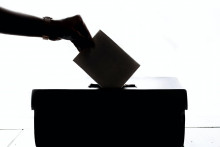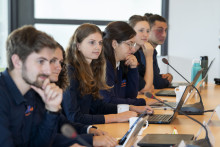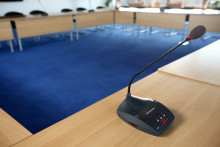UT vice president Mirjam Bult just announced the results at the U Parkhotel, where the parties gathered to hear the results. She mentioned the elections were extra exciting this year, with two new parties involved. The crisis made things even more unpredictable. Bult announced that 31,02 percent of the UT students voted; slightly less than the turnout of last year (32,78 percent). UReka loses one seat to newcomer uTOP. DAS keeps its three seats.
Maybe the most fitting conclusion for the four parties: they can all live with these election results. ‘I’m not ecstatic, but certainly also not unsatisfied with these results,’ says Max de Vries from UReka. ‘Sure, we lost a seat, but the competition increased from one party to three. We’re happy we’re still the biggest student party in the university council.’
Hidde Zijlstra from DAS is also not dissatisfied with the results. ‘Looking at all the crisis uncertainties involved, this campaign was extra tense and challenging. Still, the turnout was only about a percent less than last year, and we managed to again secure a stable amount of three seats. I think the crisis situation certainly hasn’t helped the new parties with their campaign. It may have bit them in the end.’
no employee elections
The elections for employee members of the university council didn’t take place this year. There were too few candidates who signed up, bringing the total number of employee council members starting in September to eight, compared to nine seats for students.
Genesis, the new party of ITC students Michael David and Paul Owukju didn’t get enough votes. ‘Still, we’re not disappointed,' says David. 'This was our first time, we tried our best with a primarily online campaign. We will try again next year.’
The other new party, uTOP, did manage to secure a seat. ‘Considering the time we were able to spend on this and being a new party, we’re happy with the results,’ says Jorg Wellink. ‘I can’t wait to make our voice heard, starting in September.’







